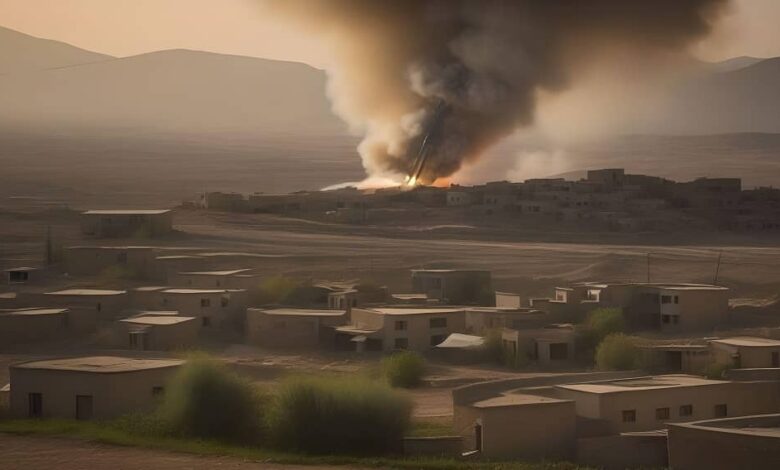Understanding Iranian Regime’s Silence on Pakistan’s Retaliatory Airstrike

iran missile hit village ai creation
Three minutes read
Written by
Farid Mahoutchi
In the previous week, the Iranian regime initiated attacks on three neighboring countries, all within a 24-hour period, asserting that the objective was to counter terrorism. However, subsequent to intelligence evaluations of the struck targets, no government or expert corroborated the military efficacy of these assaults. This has further entrenched the belief among the people of Iran and the global community that the regime’s actions were primarily propagandistic as they were provocative in nature.
Despite the vocal stance adopted by Iranian officials and media regarding the actions taken, they showed less inclination to address the reactions of the targeted countries. Specifically, in response to Pakistan’s retaliatory airstrike on Iranian territory, a conspicuous silence has been observed from the Iranian regime.
The state-run newspaper Hammihan criticized this silence on January 20, stating: “Perhaps when a military attack occurs against a country’s soil, the most ordinary expectation of its people is that political and military authorities react to the incident. Pakistani authorities had various statements at high levels after Iran’s missile attack on the ‘Jaish al-Adl’ headquarters and their subsequent retaliation on Iranian soil. However, on our side of the border, such an incident was not witnessed. Among the high-ranking authorities in our country, none have spoken about Pakistan’s pre-dawn attack on the outskirts of Saravan. The president, who spent Thursday on a provincial visit to Damavand and Firuzkuh, did not mention the Pakistan attack in any of his speeches.”
The source also indicates that the Parliament Speaker Mohammad Bagher Ghalibaf, the Commander-in-Chief of the Islamic Revolutionary Guard Corps, the Deputy Coordinator, the IRGC Spokesperson, the Army Commander-in-Chief, Chief of the General Staff of the Armed Forces, and the Minister of Defense—among other officials—remained entirely silent in response to these attacks.
Noting that this significant event was generally ignored during Friday prayer ceremonies across the country, Hammihan criticized this approach, stating, “The most prominent Friday prayer leader who mentioned Pakistan in his sermons yesterday was Seyyed Ahmad Alamolhoda. However, Alamolhoda only spoke about Iran’s operations in Pakistan and made no reference to Pakistan’s reciprocal response or the attack on certain points in Sistan and Baluchestan Province.”
The state-run news website “Khabar Online” also expressed concern about Pakistan’s reaction, writing, “This action by Pakistan can intensify public sentiments in Iraq against the government of this country due to the lack of a similar response to Iran’s repeated missile attacks on Iraqi soil. Therefore, not only the government but even Iran-supportive groups in Iraq may come under pressure from the people of this country. Apart from its potential impact on power equations in Iraq, this issue will also have an effect in the future in case of a recurrence of such actions by Iran on Iraqi soil.”
While gestures of goodwill and de-escalation between Tehran and Islamabad were exchanged in the subsequent days, Pakistan’s attack on Iranian soil, coupled with the casualties among Iran’s military and paramilitary forces in recent weeks in Yemen and Syria, has conveyed clear messages to the people of Iran and the international community.
Despite projecting hollow slogans and showcasing military might, the Iranian regime is undeniably vulnerable. The recent missile launches toward neighboring countries can be attributed to the regime’s internal weaknesses and ongoing issues. Fawad Hossein, the Iraqi Foreign Minister, expressed his thoughts on Iran’s missile launch to Erbil, stating, “The Islamic Republic of Iran has internal problems and is trying to export them outside the country.”
Internally, the people of Iran are well-acquainted with the regime’s strategies. There is a growing realization among the populace that the regime’s ostentatious displays of strength, including missile launches, stem from a deep-seated fear of its own citizens and the potential for an uprising. The regime’s objective of generating a crisis in the region is perceived as a deliberate tactic to divert attention away from pressing internal issues. In other words, the regime’s outward display of strength is a smokescreen for its internal vulnerabilities.
This underscores that the only language the mullahs understand is one of assertiveness.
However, events of the past three months have also shown that, despite significant losses and casualties, and despite the associated risks, the regime still refuses to abandon its warmongering stance. Therefore, if the world genuinely seeks to halt this aggression for good, recent popular uprisings in Iran must be acknowledged as an undeniable reality, and respect must be accorded to the Iranian people’s desire for the overthrow of this regime.
Understanding Iranian Regime’s Silence on Pakistan’s Retaliatory Airstrike

